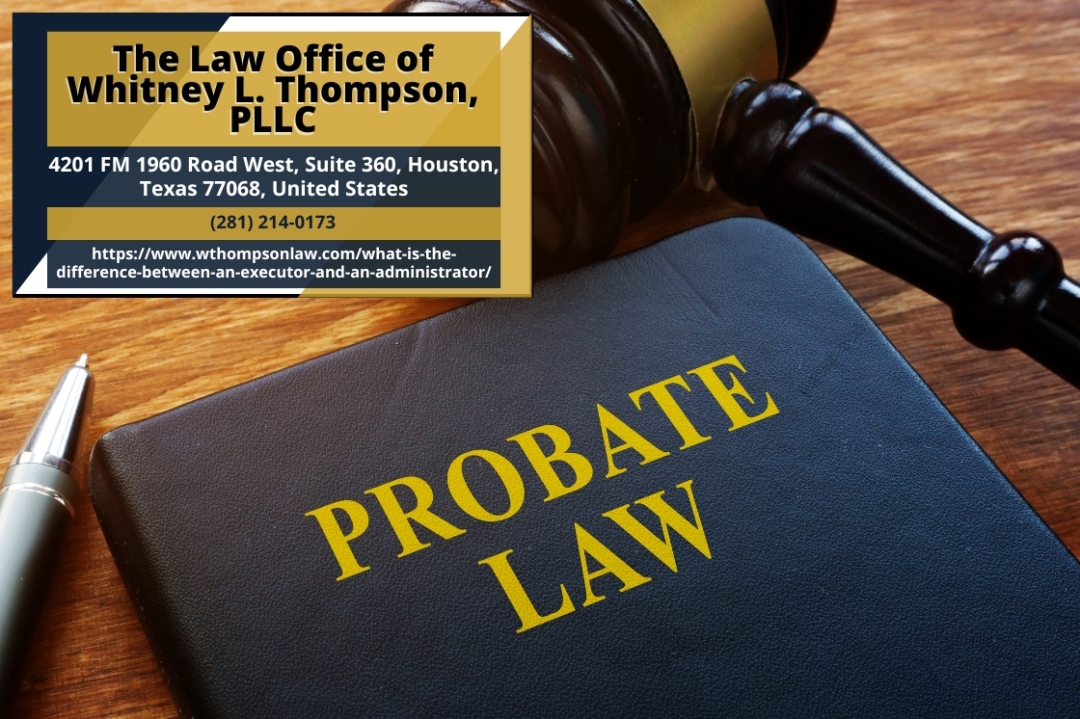The probate process in Texas involves managing the distribution of assets and debts of a deceased individual who did not arrange for direct asset transfers through trusts, joint ownerships, or beneficiary designations. Houston Probate Attorney Whitney L. Thompson (https://www.wthompsonlaw.com/what-is-the-difference-between-an-executor-and-an-administrator/) explains that a court-appointed personal representative takes on the responsibility of managing the decedent’s estate, a role that may be filled by an executor or an administrator. Both roles carry comparable duties in settling the deceased’s affairs, which include inventorying and managing assets, addressing debts and taxes, and distributing remaining assets to beneficiaries.
An executor is designated in a will to oversee the estate in accordance with the decedent’s instructions. If a valid will exists, the executor assumes responsibility for ensuring the decedent's wishes are carried out accurately. Houston probate attorney Whitney L. Thompson notes that managing an estate often involves complexities, such as locating heirs, dividing property, or addressing challenges to the will. Executors must ensure the estate is distributed according to the terms of the will, even in challenging or unclear circumstances.
When no valid will exists, the court appoints an administrator to manage the estate. This occurs when the deceased dies intestate, leaving no guidance for asset distribution. The administrator follows Texas statutory guidelines to locate heirs and equitably distribute the estate. Houston Probate Attorney Whitney L. Thompson explains that an administrator faces unique challenges, including identifying heirs who may be unaware of their connection to the estate or dealing with disputes over inheritance rights.
Executors and administrators share core responsibilities in the probate process. Both roles involve safeguarding the decedent’s assets, addressing debts, and ensuring the lawful distribution of the estate. Compensation for their work is typically defined in a will for executors or set by statutory rates for administrators. Regardless of the role, the court oversees the actions of the representative to ensure compliance with applicable laws and fair treatment of beneficiaries.
Specific criteria must be met to serve as an executor or administrator in Texas. Requirements include being at least 18 years old, of sound mind, a United States resident, and free of disqualifying legal or personal circumstances, such as felony convictions without restoration of civil rights. Additionally, individuals deemed unsuitable by the court may be ineligible. Executors residing out of state must appoint an in-state agent to handle legal documentation. These requirements ensure that the personal representative can fulfill the role’s substantial responsibilities effectively.
The terms executor and executrix are often used interchangeably. The distinction lies in traditional gender-specific language, with "executor" referring to males and "executrix" to females. Modern legal documents often adopt the gender-neutral term "executor," but older wills may still use "executrix." Regardless of terminology, the duties and expectations remain identical, requiring the representative to act in the best interest of the estate and its beneficiaries.
The probate process can be daunting, particularly for executors or administrators managing estates without prior experience. Tasks such as identifying assets, resolving debts, and ensuring proper distribution require careful attention to legal and financial details. Whitney L. Thompson emphasizes the importance of working with a knowledgeable probate attorney to navigate these responsibilities. A Houston probate attorney can help personal representatives handle complex estates and avoid potential pitfalls during the probate process.
Planning ahead can reduce the burdens placed on loved ones after a person’s passing. Establishing a thorough estate plan ensures that assets are distributed according to the individual’s wishes while minimizing stress and uncertainty for family members. Whitney L. Thompson advises that families and individuals consider consulting an attorney to draft wills and other essential documents that provide clarity and direction for estate management.
The Law Office of Whitney L. Thompson offers guidance to executors, administrators, and families navigating the probate process in Texas. A consultation can provide insights into the legal responsibilities of estate management and help ensure that the deceased’s affairs are settled efficiently and lawfully.
About The Law Office of Whitney L. Thompson:
The Law Office of Whitney L. Thompson provides dedicated legal services in probate and estate planning in Houston, Texas. Focused on helping clients manage their loved ones' estates with care and precision, the firm offers support for executors, administrators, and families in need of guidance through the complexities of probate law.
Embeds:
Youtube Video: https://www.youtube.com/watch?v=fcKEXfNYKKE
GMB: https://www.google.com/maps?cid=9428708165305469162
Email and website
Email: info@wthompsonlaw.com
Website: https://www.wthompsonlaw.com/
Media Contact
Company Name: The Law Office of Whitney L. Thompson, PLLC
Contact Person: Whitney L. Thompson
Email: Send Email
Phone: (281) 214-0173
Address:4201 Farm to Market 1960 Rd W Suite 360
City: Houston
State: Texas 77068
Country: United States
Website: https://www.wthompsonlaw.com/


